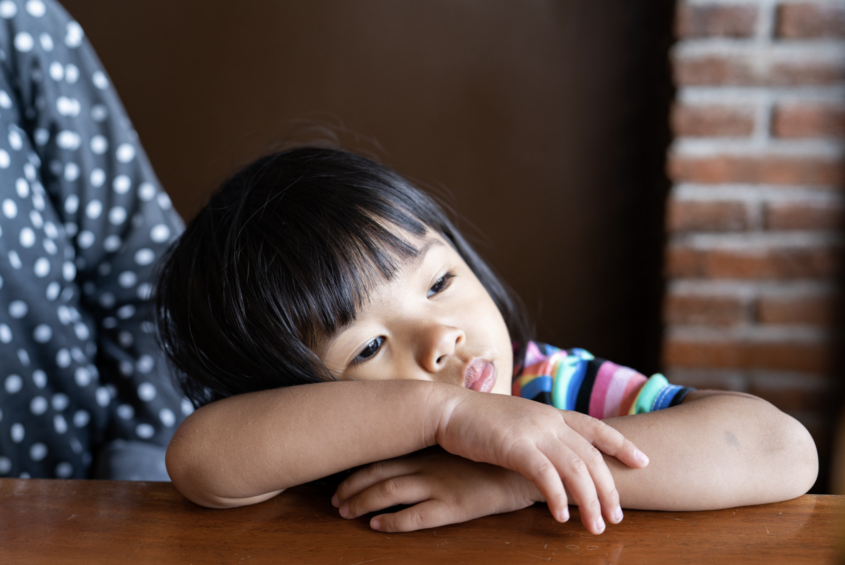Everyone grieves differently. We respect you know your child best. This is a guideline for parents based on commonly observed reactions and behaviors of children experiencing grief. These suggestions are intended to help you and your family cope positively during a time of loss.
Preschool (Ages 2-4 years old)
Developmental considerations: Preschool children have not yet developed concrete thinking or the concept of permanency. Children of this developmental stage are still learning communication skills, thus expressing feelings may lead to frustration.
Common responses to loss
- Generalized anxiety and crying
- Repetitive questions to confirm permanence of death
- Needing to be close to a trusted loved one
- Disruption to sleep patterns
- Regression behaviors, e.g., potty accidents or thumb sucking
- Irritability/feelings of frustration leading to temper tantrums
How to encourage positive coping
- Maintain child’s daily schedule as best as possible
- Explain death with honest, concrete responses, e.g., “Grandpa’s body stopped working, and he died”
- Avoid phrases that can be misinterpreted by children, e.g. “lost,” “gone” or “passed”
- Give options when possible to provide child with sense of control
School Age (Ages 5-8 years old)
Developmental considerations: School-age children are still developing concepts of permanency. Children at this developmental stage have strong feelings that their thoughts or actions influence what happens in the world around them.
Common responses to loss
- Changes in sleeping patterns or appetite
- Analyzing safety of selves and other family members
- Asking clarifying questions to confirm permanency of death
- Impulsive behaviors
- Avoidance or acting as though nothing has occurred
- Regressive behaviors such as bedwetting, needing parents to be present for activities once done alone
How to encourage positive coping
- Explain death with honest, concrete responses, e.g., “Grandpa’s body stopped working, and he died”
- Avoid phrases that can be misinterpreted by children, e.g., “lost,” “gone” or “passed”
- Participate in discussions regarding death of loved one should your child initiate conversation
- Offer options when possible to allow child to gain sense of control
- Provide child with play and energy release opportunities
Preteen (Ages 9-12 years old)
Developmental considerations: Typically, children of this age can conceptualize the permanency of death and consider how it will affect them long term.
Common responses to loss
- Greater concern for safety in the world
- Worrying about potential death of other family members
- Utilizing play as an avenue to reenact death or event
- Difficulty focusing on tasks like schoolwork
- Expressing strong feelings in a way that some might see as “acting out”
- Withdrawing from social situations
- Complaints of physical ailments, e.g., stomach ache, headache, fatigue, generalized pain
How to encourage positive coping
- Discuss death honestly and openly as child initiates
- Encourage your child to engage in activities or relationships that support feelings of security
- Maintain a normal schedule if possible
- Offer choices when available
- Model self-care behaviors and positive expression of feelings, e.g., journaling, drawing, exercising
- Provide a listening ear without unsolicited advice
- Communicate with child’s school and extracurricular activities to provide child with additional support
Adolescent (Ages 13-18+ years old)
Developmental considerations: Adolescents understand the permanency of death. Teens also may start to question the meaning of life when experiencing loss.
Common responses to loss
- Turning to peers for support instead of family members
- Disruption of sleep schedule and appetite
- Loss of concentration in school or hyperfocus to activities
- Role identity confusion within family, e.g., “parenting” younger family members
- Worrying about the death of other family members
- Intense and/or spontaneous emotional reactions
- Increased risk of harmful behaviors, e.g., reckless driving, drugs/alcohol
How to encourage positive coping
- Maintain consistent expectations and home structure/rules
- Reinforce safety and security, even when teen does not ask
- Allow teen to express thoughts and listen, avoiding urge to “fix”
- Provide choices for involvement in a memorial should teen express interest, e.g., speak at memorial service, make craft for casket or legacy project to remember loved one
- Model self-care behaviors and positive expression of feelings, i.e. journaling, drawing, exercising
- Seek professional advice if your child needs further support
Contributing author Alicia M. Cesare, Certified Child Life Specialist. As a CCLS, she uses evidence-based practices that utilize therapeutic play to prepare, educate and support children and families experiencing stress, fear and anxiety in a variety of medical- and community-based settings. She worked with Country Meadows to create this useful tool for families.




